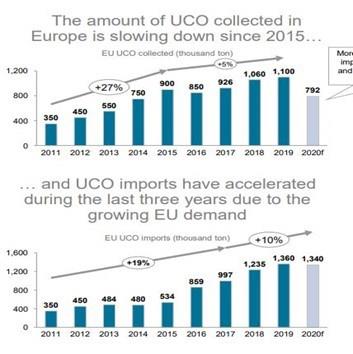September 2022
EWABA position on the trilogue negotiations of key legislative files ReFuelEU Aviation, FuelEU Maritime and REDIII
|
"The EU must deliver a regulatory framework ensuring a fair use of waste lipid feedstocks across aviation, maritime and road transport sectors"
|
EWABA represents the interests of the EU waste-based and advanced biodiesel industry. In 2021 alone, EWABA members produced more than 2 million tons of waste-based and advanced biodiesel for the road and maritime sectors, saving more than 6.3 million tons of CO2 equivalent emissions.
Waste lipid-based biodiesel produced by our members using waste-based feedstocks in Part B of Annex IX of Directive 2018/2001 (the revised Renewable Energy Directive or REDII), namely used cooking oil (UCO) and animal fats, and different waste lipid advanced feedstocks from part A of Annex IX of the same Directive is an essential tool to reduce transport emissions and drive decarbonisation.
In order to achieve the best possible decarbonisation level of the transport sector, feedstocks with limited availability must be used in the most efficient way ensuring a win-win situation for all transport modes and EU citizens.
We call on the trilogue negotiators to work towards a regulatory framework which ensures a fair use of waste lipid feedstocks across aviation, maritime and road transport sectors. In doing so we invite negotiators to take into consideration the following principles:
- Waste lipids should be equally promoted in all transport modes and used especially where they are most efficient and achieve the best GHG savings.
- Appropriate and strong investment signals must be given to much-needed developing technologies which will be key for long term decarbonization, in particular of the aviation, such as e-fuels, ethanol-to-jet, and gasification/Fischer-tropsch. If we overrely on “low hanging fruit” feedstock in the short term, developing technologies for the long term will not be adequately promoted.
- The potential of waste-based and advanced biodiesel should be used to the maximum by enabling higher biodiesel blends – efficient implementation of B10 for passenger cars which will still be on the road for decades to come and B100 for difficult to electrify heavy duty vehicles. This will also contribute to strengthen the EU’s independence from fossil fuels imported from Russia.
- Job protection (especially in SMEs) should be guaranteed. The EU biodiesel industry employs over 25.000 people with 50+ manufacturing sites spread across Member States. Potential plant closures due to feedstock prioritisation will result in acute negative economic and social consequences, especially in rural areas.
In order to achieve a solid holistic approach to transport decarbonidsation, we strongly suggest that the REDIII, ReFuelEU and FuelEU complement each other and include the following measures:
- ReFuelEU Aviation
- Broaden the feedstock base of what is to be considered as SAF to include other non-Annex IX sustainable feedstocks such as category 3 animal fats, and potentially crop-based feedstocks in accordance to REDII sustainability criteria.
- Include a 0,325 Mtoe limitation for Annex IXB biofuels so as to ensure that they are equally promoted in road, maritime and aviation transport based on their limited availability and higher efficiency and GHG savings in road and maritime transport.
- Include a high sub-mandate for e-fuels applicable as from the first year of the date of applicability of the Regulation (+ 5% in 2030 in any case).
- Consider postponing the date of applicability of the Regulation to 2027.
- REDIII
- Reintroduce flexibility for the Annex IXB limit in Member States.
- Allow double counting to biofuels produced from Annex IX Parts A and B feedstocks as included in the Council General Approach.
- Enable a widespread and faster deployment of B10 by terminating the B7 protection grade.
- FuelEU Maritime
- Equal promotion of all waste and advanced feedstocks with no unjustified negative provisions leading to discrimination of specific technologies.
Background
- Waste lipids can be processed by 2 different technologies for the production of biofuels with significantly different efficiency and uneven GHG savings potential:
a) Waste lipids Biodiesel used for road and maritime transport – using a transesterification process for the production of Fatty Acid Methyl Ester (FAME) with higher efficiency (1 000 kg of UCO = 1 004 kg of biodiesel) and higher GHG emission savings (above 90% compared to fossil fuels).
b) Waste lipids HEFA used for aviation – which is essentially Hydrotreated Vegetable Oil (HVO) with an additional isomerization process to render the resulting fuel airworthy, with lower efficiency (1 000 kg of UCO = 610 kg HEFA) and lower GHG savings (76% compared to fossil fuels).

Based on the findings of an assessment of different UCO processing technologies performed by Dutch consultancy Studio Gear Up (accessible here) we estimate that a 2% aviation blending mandate in 2025 would require up to 1.5 million tons of waste lipids diverted from waste-based biodiesel production from the road and maritime sectors, resulting in a minimum of 1 million tons of additional GHG emissions released to the atmosphere per year. And this amount is only set to increase in parallel to the upwards trajectory of the blending mandate.
- Waste lipids and especially UCO are limited by nature:
- The existing EU UCO generation is below 1 million tons.
- Already today the vast majority of EU sourced UCO comes from imports.
- Domestic collection has stalled and imports have started a downward trend.
- The joint demand for waste lipids emanating from the REDIII proposal, FuelEU Maritime and ReFuelEU Aviation could exceed by more than 8-fold the EU domestic collection capability.

|
Source: Greenea Horizon 2030: Which investments will see the light in the biofuel industry? (accessible here)
|
****
ewaba.eu
Back to news